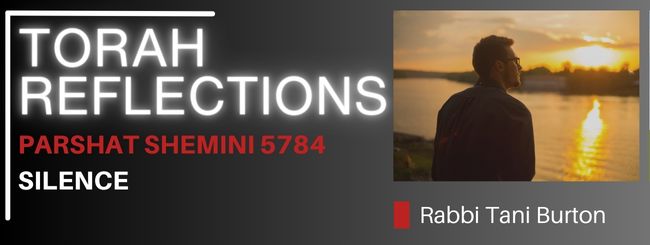בס”ד
Introduction
In Parshat Shemini we focus on Aaron’s silence amidst adversity. Explore the value of silence amidst modern noise for growth and deeper understanding.
Integrating Torah into one’s life through reflection and conversation can be an incredibly fun and engaging experience. It’s a journey of discovery, where ancient wisdom and timeless teachings come to life in our daily experiences. Through reflection, we have the opportunity to dive deep into the rich tapestry of Torah, extracting profound insights and lessons that resonate with our modern lives. The joy lies in the ‘aha’ moments, those instances when a Torah verse or story suddenly connects with our personal challenges, aspirations, and values. And when we engage in conversations about Torah with others, it becomes an interactive exploration, where diverse perspectives and interpretations enhance our understanding. These dialogues often spark excitement and intellectual curiosity, making the learning process both enjoyable and fulfilling. Torah becomes a vibrant and dynamic part of our lives, offering not just guidance but also a source of endless fascination, connection, and growth.
NOTE: Don’t feel obligated to go through every source or answer all the questions—unless you want to. Even one source, or one question will give you plenty of material for discussion and meditation. Enjoy this!
Some thoughts from the parsha
Leviticus 10:3 presents Aaron’s response to the death of his sons Nadav and Avihu with silence, following guidance from Moses. Rabban Shimon ben Gamliel extols silence as a virtue, akin to enduring insults without reaction (Avot 1:17). Amidst the noise and distractions of modern life, we need to explore the value of silence. Rashi interprets Aaron’s silence as a process of withholding reaction until understanding is gained, similar to Jacob’s reaction to Joseph’s dreams. Similarly, Rabbenu Yona emphasizes the significance of silence as a stance of patience and receptivity to deeper wisdom (Avot commentary). This type of silence is not avoidance but a form of holy curiosity, fostering growth and deeper relationships.
Now, consider these questions about silence for deep, personal reflection and conversation:
- How does Aaron’s silence in response to tragedy inspire reflection on our own reactions to adversity? How might silence offer a pathway to deeper understanding and acceptance in challenging times?
- In what ways do you prioritize silence in your own life amidst the constant noise and distractions of modern society? How does silence contribute to your well-being and spiritual growth?
- Reflecting on Rabban Shimon ben Gamliel’s perspective, how do you typically respond to insults or challenges? Do you find strength in silence, or do you tend to react impulsively?
- Consider the concept of “waiting and seeing” in moments of difficulty. How might embracing silence and patience, as highlighted by Rashi and Rabbenu Yona, lead to a deeper understanding of life’s complexities and strengthen your faith?
- Recall instances where you’ve reacted hastily to a situation. How might adopting a stance of silence, characterized by holy curiosity and deep reflection, enhance your relationships and lead to personal growth?
Shabbat Shalom!
By Rabbi Tani Burton
If you want more questions for contemplation, also consider last week’s Parasha. PARSHAT TZAV 5784 – THE OFFERING OF TORAH
© Copyright, all rights reserved. If you enjoyed this article, we encourage you to distribute it further.
Our blogs may contain text/quotes/references/links that include copyright material of Mechon-Mamre.org, Aish.com, Sefaria.org, Chabad.org, and/or AskNoah.org, which we use in accordance with their policies.
